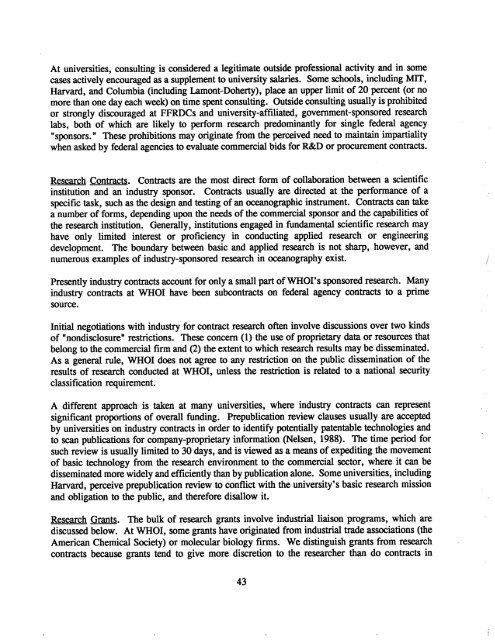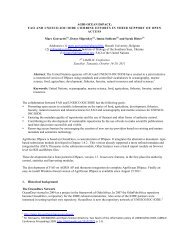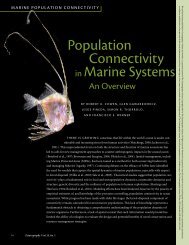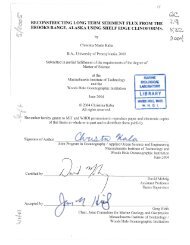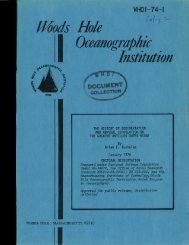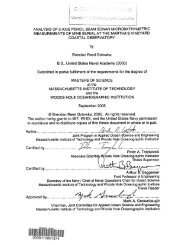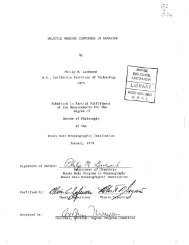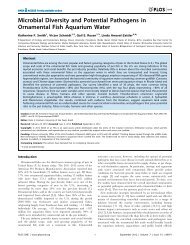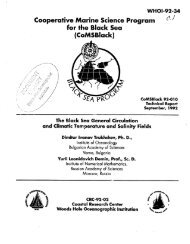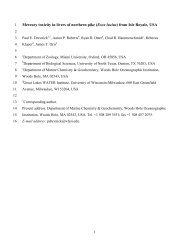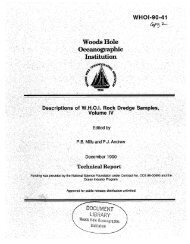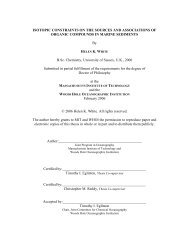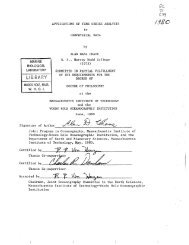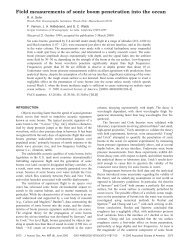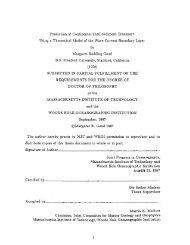WHOI-90-52
WHOI-90-52
WHOI-90-52
You also want an ePaper? Increase the reach of your titles
YUMPU automatically turns print PDFs into web optimized ePapers that Google loves.
At universities, consulting is considered a legitimate outside professional activity and in. some<br />
cases actively encouraged as a supplement to university saares. Some schools, including MI,<br />
Harard, and Columbia (including Lamont-Dohert), place an upper limit of 20 percent (or no<br />
more than one day each week) on time spent consulting. Outside consulting usually is prohibited<br />
or strongly discuraged at FFRDCs and university-affiliate, government-sponsored resech<br />
labs, both of which are likely to perform resech predominantly for single federa agency<br />
"sponsors." These prohibitions may originate from the perceived nee to maintan imparialty<br />
when asked by federa agencies to evaluate commercial bids for R&D or procurement contracts.<br />
Reseach Contrcts. Contrcts are the most direct form of collaboration between a scientific<br />
institution and an industr sponsor. Contracts usuay are directe at the performance of a<br />
speific task, such as the design and testing of an ocographic instrment. Contracts ca tae<br />
a number of forms, depending upon the nees of the commercial sponsor and the capabilties of<br />
the resech institution. Generaly, institutions engaged in fundamenta scientific resech may<br />
have only limite interest or proficiency in conducting applied resech or engineering<br />
development. The boundar between basic and applied resech is not shar, however, and<br />
numerous examples of industr-sponsored resech in ocography exist.<br />
Presently industr contracts accunt for only a small par of<strong>WHOI</strong>'s sponsored resech. Many<br />
industr contrcts at <strong>WHOI</strong> have been subcontracts on federa agency contrcts to a prime<br />
source.<br />
Initial negotiations with industr for contrct resech often involve discussions over two kinds<br />
of "nondisclosure" restrctions. These concern (1) the use of proprieta data or resources that<br />
belong to the commercial firm and (2) the extent to which resech results may be disseminated.<br />
As a genera rule, <strong>WHOI</strong> does not agree to any restrction on the public dissemination of the<br />
results of resech conducte at <strong>WHOI</strong>, unless the restrction is relate to a national seurity<br />
classification requirement.<br />
A different approach is taen at many universities, where industr contracts ca represent<br />
significat proportons of overal funding. Prepublication review clauses usuay are accpted<br />
by universities on industr contrcts in order to identify potentially patentable technologies and<br />
to sc publications for company-proprieta information (Nelsen, 1988). The time period for<br />
such review is usually limite to 30 days, and is viewed as a meas of expeitig the movement<br />
of basic technology from the resech environment to the commercial setor, where it ca be<br />
disseminated more widely and effciently than by publication alone. Some universities, including<br />
Harard, perceive prepublication review to conflct with the university's basic reseach mission<br />
and obligation to the public, and therefore disalow it.<br />
Reseach Grats. The bulk of resech grats involve industral liaison programs, which are<br />
discusse below. At <strong>WHOI</strong>, some grants have originate from industral trde associations (the<br />
America Chemica Society) or molecular biology firms. We distinguish grats from resech<br />
contracts becuse grats tend to give more discretion to the resecher than do contrcts in<br />
43


